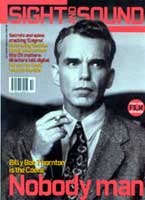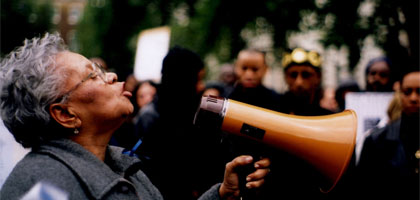
My Tears Will Catch Them

Threats of legal action from the police have prompted the makers of Injustice, a new film about four cases of death in custody, to conduct guerrilla screenings across the UK. Adrian Cooper reports
A group of people huddle at the exit of London's Turnpike Lane tube station. Fat droplets of August rain have given way to sunlight, but the crowd stays, hovering uncertainly under the concrete canopy until a young woman arrives and asks in a hushed voice: 'Are you here for the screening?'
The film in question is a feature-length documentary called Injustice which has suffered a curious fate since it was due to be launched at the Metro cinema in London on 6 July. Minutes before the advertised start, the venue received a fax from Russell, Jones & Walker Solicitors, the firm representing the Police Federation. The fax read: 'You should be aware that should your screening go ahead, our clients will have no hesitation in pursuing their rights against your company for the very substantial damages that will then be their only means of compensation and vindication.' Metro director Eva Kirkhope felt she had little choice but to cancel the screening.
A few days later London's Conway Hall received a similar fax, also moments before the film was due to begin. Again the managers declared they would cancel the show, but here the audience insisted on staying, barricading themselves into the building when two police officers arrived. The audience got their screening, but other independent venues - the Lux cinema in London and the Cornerhouse in Manchester among them - have been pressured into self-censorship because they lack the time and financial resources to seek legal advice. Production company Migrant Media is at present outmanoeuvring the Police Federation by switching venues: instead of the Lux, a pub nearby; not the Cornerhouse but a café next door; off up Turnpike Lane where a crowd of 200 waits in anticipation.
There have been more than 1,000 cases of death in police custody in Britain since 1969 but no single officer has been convicted of wrongdoing. Injustice is an account of four such cases: Joy Gardner (28 July 1993), Shiji Lapite (16 December 1994), Brian Douglas (3 May 1995) and Ibrahima Sey (16 March 1996). The film - made over a seven-year period by Ken Fero and Tariq Mehmood - focuses on the painful journey undertaken by the victims' families to expose the circumstances of their deaths. In 1997 the families joined together to form the United Families and Friends Campaign and it's the story of their fight for justice - charted through vox pops after hearings and footage from demonstrations - that drives the narrative. It's punctuated by moving interviews, sometimes running uninterrupted for as long as two minutes, and descriptions of Brian, Shiji, Ibrahima and Joy that ensure they are perceived not just as statistics but as individuals whose families mourn them amid their growing anger.
Fero and Mehmood don't employ any technical trickery to intensify the atmosphere or deliver punch. They don't need to; their film's power lies in the families' experiences and words and the mounting case against the police. A voiceover from actress Cathy Tyson (Mona Lisa, Priest) threads the elements together and a haunting hymn sung by Violet Corlis sends shivers over the skin.
The polemic makes no excuses for its lack of police representation. Police officers get to speak only twice: once in a press statement following the misadventure verdict on Douglas' death which says how traumatised the officers were as a result of the experience, a sequence that meets with gasps of disbelief at every screening. The second occasion is a confrontation between Douglas' brothers and an officer who, arms folded, makes sporadic attempts to deflect questions about why a police photographer is snapping people entering and leaving a public meeting to discuss the verdict.
Instead, Fero and Mehmood show us such scenes as Lapite's widow Olamide Jones wailing 'Why-Why-Why?' in Stoke Newington police station: why did Lapite die of asphyxia? No attempt to answer her pleas is made; the officers stand buffered behind glass walls or on a balcony overlooking Jones as she falls to the floor in grief. This silence and distance runs throughout: the families are excluded from a conference about death in custody organised by the Police Complaints Authority; we see no government response to the campaign's presentation of a plaque at 10 Downing Street following a peaceful demonstration in 1999.
Migrant Media did ask the police for interviews during filming, but received no reply, though as Fero says, 'Even if we had got the interviews I don't think we would have used them, because everywhere the families went they faced brick walls and visually we wanted to get that into the film.' The Police Federation's bid for vindication calls for 'certain references to be edited from the film', but the film-makers have so far refused to re-cut it or to stop screenings. As a result a legal chess game has unfolded, boosting the moribund status of the families' campaigns in the mainstream press and challenging notions of free speech in Britain today.
When Gardner's mother Myrna Simpson says in the film, 'My tears will catch them...', her sorrowful and angry determination reflects the way word-of-mouth, print, television, radio and internet coverage have already drawn more than 2,000 people to screenings of Injustice in London, Manchester and Liverpool. Inside each venue the film's meaning resonates in different ways for different audiences. At Turnpike Lane, the Roger Sylvester Justice Campaign was gathered to discuss its progress since his death in January 1999. Here Injustice provided a therapeutic point of identification for the family's grief and encouragement in their quest for justice. As Douglas' sister Brenda Weinberg says, 'It's not just about those in the film, it's for others too. It's a chance to share the anger and pain.'
In Liverpool, where the screening was shifted to a squatted gallery where 300 people sat transfixed on mats and metal chairs, a white working-class audience found different meanings. 'This film is about black people in London,' said a man who wanted to be identified only as 'Peter', 'but the police's attitude is the same, whether you're white, black, Chinese or Irish.' What resonated for Peter was the way Lapite was labelled a drug dealer rather than a father of two in the British press after a police officer claimed to have found crack near the scene of his arrest. The same thing had happened to Peter's brother and he held the police responsible for a press portrait that depicted his sibling as a drug dealer and thug. Following the screening a group gathered to launch the Jimmy Ashley Justice Campaign, the Ashley family's first nervous step in a fight for justice since Jimmy was gunned down on 15 January 1998. For his sister Pauline and her family, the film had become what Mehmood describes as 'a metaphor for organising, for resistance'.
The momentum behind Injustice is building fast. It formed part of the programmes of the Black Filmmakers Magazine International Film Festival in September and the Sheffield International Documentary Festival in October. But at the time of going to press its planned late-September release at Brixton's Ritzy Cinema was not confirmed. To challenge the legal validity of the Police Federation's attempts to suppress the film, Index on Censorship, Liberty, Human Rights Watch and other similar groups are discussing staging a screening to confront what a spokesman at Index sees as 'direct censorship... because they are using libel laws to suppress debate.' Though this coalition would provide legal and financial clout, there has so far been no concrete commitment. In a country that champions human rights throughout the globe, why do knees quiver when injustice creeps closer to home?
Set up in 1989 to feed the media with stories and interviews about immigration and race, Migrant Media now has a string of broadcasting credits to its name. In 1995 the company's 50-minute film Justice Denied about Joy Gardner, who suffocated during a deportation raid, was broadcast on Channel 4. At about the same time Migrant began filming Injustice, sparked by Lapite's death. The motivating force, according to Mehmood, was simple: 'We just did not agree with death in custody.'
As with all their previous commissions, Fero and Mehmood took footage to ITV, the BBC and Channel 4 to talk about funding. Although individual commissioners expressed interest, there were two main objections: first, the story wasn't 'new' because there were no planned trials and second no channel wanted to back anything that might later prove libellous. Fero and Mehmood continued shooting until 1999 when the Downing Street visit provided a natural stopping place. At this point, after five years of filming and working at odd jobs to survive, they received £20,000 from the Soros Documentary Fund towards shooting the interviews and £20,000 from the East London Film Fund for post-production - just 10 per cent of the estimated £400,000 budget.
As Fero points out, 'No one in this country working for television could have made this film. It isn't because we're better people or better film-makers, it's about how we work with people, it's about having respect.' Weinberg attests to the film-makers' commitment: 'Some of the families didn't even realise they were making a film. Ken was always around, he was personally involved.' Migrant was pivotal in setting up the United Families and Friends Campaign and the levels of trust Fero and Mehmood established give Injustice its intimacy and power. 'We always approach films in the same way', says Fero. 'We get involved with the people and get involved with the story.'
At its birth in 1982 Channel 4 replaced the regional funding bodies almost entirely, encouraging radical and community-based film-makers to pursue broadcasting objectives. The Workshop Agreement, a pact between IFA (Independent Film-makers Association) and ACTT (Association of Cinematograph and Television Technicians), created a climate in which groups like Black Audio, Amber and Sheffield Film Co-op could grow and feed Channel 4 such strands as The Eleventh Hour and People to People. This landscape has now almost vanished. The accessibility of digital equipment should make low-budget issue-based documentary film-making more feasible, but as Fero points out: 'At the end of the day it comes down to time and commitment... You can't be worrying about paying your mortgage and make films like this.' As documentaries like Injustice start to become less common, they appear more radical to broadcasters and distributors not because of their content but because of the bland media environment that surrounds them. 'It's an insane situation,' says Fero, 'when someone has to give up seven years of their life to make a documentary. But that's the way it is in this country, there is a documentary history, but somewhere it has been lost.'
The voices silenced in the present broadcasting landscape aren't so much those of the film-makers as of people like Myrna Simpson. 'You don't know the pain, you don't know the suffering, you don't know how I've cried. My tears will catch them. My tears will catch them.'
